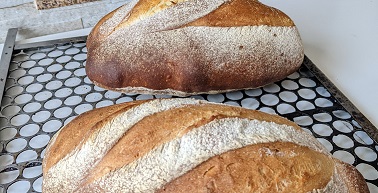First published in Spring 2023 for Geez Magazine’s “Bread and Wine” issue. Reprinted with permission.
We were wild once. We floated on the breeze in the primal forests of the earth. We landed on various living and rotting creatures and nibbled on their juices. No Keto diet for us, please – we love to eat sweet, carby things. We ate, reproduced, and ate some more. And so, over millions of years, we evolved.
One day, not so long ago in the history of the earth, we landed in something gummy and delicious and decided to stay. We gorged on this mix of wheat flour and water, eating up the sugars and releasing B vitamins, carbon dioxide, and alcohol. We made more of our single-celled daughters, growing lumps in the sides of our microscopic blobs of bodies until they split off and became their own organisms. We formed a colony, transforming this mushy pile into magic.
Some might call it rotting. But, put to human culinary use, our work became known as fermentation. We were a lovely, pungent puff of bubbling, rising dough – yeast in a sourdough starter.
“We” are a blend of various strains of yeast. We are part of the fungi kingdom – not exactly animal, not exactly plant. We thrive in the crevices, the cracks, the forgotten, dank places. Along with bacteria, we do the “dirty work” of life on earth, digesting obsolete organic matter back into the ground.
In the kitchen, we transform not just bland, flaccid dough. We also turn single-toned grape juice into deeply-textured wine. We convert grainy, sugary liquid into effervescent beer.
Many people around the world refer to us as the “mother.” We’ll take that. We co-opt cycles of death and create the conditions for life. We gestate deliciousness imperceptibly, slowly working our way through the entire batch. We utilize the miniscule, the edges, the places where one thing becomes another, where transitions (perhaps even revolutions) occur. No wonder Jesus used us to talk about the kingdom of heaven (Matthew 13:33).
We are the unheralded, tiny superheroes of human gastronomy, elevating the basic task of eating from quotidian to divine. Bread and wine – they would be nothing without us, just flat dough and fruit juice. But with us, they become transcendent, the stuff of family suppers by glowing hearths, mirth and merriment over clinking glasses, and, of course, the holy Eucharist – the body and blood of Christ, God’s own self.
But it all starts with something small, the tiniest blob of yeast mixed into an enormous batch of dough. All you need is a little.
Once we get woken up in a sourdough starter, humans mix part of the starter into some water and oil, then add more flour and salt. Then the magic begins.
Nestled within the dough, we gobble up glucose. For each glucose molecule we ingest, we release two molecules of carbon dioxide and two of ethanol. Ethanol is a form of alcohol. It’s the thing you humans drink too much of and then start to walk sideways and slur words.
Our excretions become your treasure, making miniscule pockets of fragrant air within the dough. A protein web called gluten traps these air bubbles. The more we digest, the more the gluten network strengthens and elongates. As the hours pass, we steadily eat away, breaking down the parts of the wheat that are harder for human bellies to handle, making nutrients more readily absorbable. (You’re welcome.)
Humans fold the dough several times over the course of the rising, which gives the gluten more structure and allows the dough to hold in more of our gassy output. After we’ve worked our magic, which takes three to 12 hours, depending on the room temperature, the dough is double or triple its original size. It smells sweet, sour, fruity, savory, nutty, and utterly delightful, if we may say so ourselves. Time for shaping, second rising, and baking.
After all that, it’s time to sink your teeth into a crunchy, fluffy heaven-in-a-mouthful. (You’re welcome, again.)
While most of us get killed off in the baking, humans save part of us aside to reactivate for future loaves. And so, the cycle continues – eating, reproducing, eating, evolving. We’ve formed a lively partnership with you humans.
More than that, we live within you. We’ve colonized your gut, your skin, your mouth, your throat. These are different strains of yeast than those used for breadmaking, but nonetheless we are part of you. You eat us. You need us. Sometimes you have too much of us in your bodies, in the form of yeast infections.
We hope you humans survive this time of transition you’re in. We in the fungi kingdom will be here, no doubt, after the apocalypse. After all, we thrive in dark, desolate places. We digest death and prepare the way for life to spring up again. Regardless, we’re here to help you, to make new things arise. Just mix us in, and we’ll get to work.

